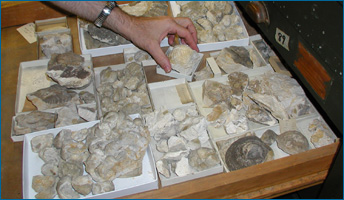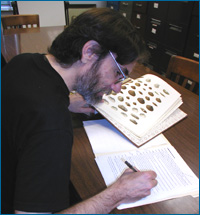
Though David has put in his time crouched in the muddy drainage ditches of Alabama and Georgia staring at fossilized seashells, these days he does most of his research on paper, online, or in museums. Playing the historian, he pores over scientific texts going back almost 250 years, recording every mention of different mollusk lineages and figuring out when and where they originated, lived, and went extinct. Similarly, he studies scientific papers and databases online, ferreting out the same information, and travels to museums the world over to add their mollusk specimens to his database. He describes this work as “a gigantic jigsaw puzzle — making sure that all these names and places are put in the right slots” and admits that “it would either drive you completely nuts, or you would completely groove on it.” Needless to say, David is the sort that “grooves” on this detective work.

Though it might initially seem that working with a computer database of fossil mollusks pales in comparison to digging up an Oviraptor, the thrill of discovery makes his work exciting: “There have been a whole bunch of surprises. In fact, that’s what makes me come in to work everyday: this steady stream of surprises. There are discoveries that open up whole new sets of questions, so I keep getting these jolts of adrenaline as I work on this stuff.” With his mollusk database, David seeks out the answers to key questions in the history of life. In what environments do lineages evolve major new traits? David performed a few computations and statistical checks and was surprised to find that, for marine invertebrates from sponges to sea urchins, over the past 250 million years, the answer is “in shallow water” — even when they only live in the deep sea today. Where on Earth do new lineages evolve? Unexpectedly, David’s numbers suggest that new lineages tend to arise in the tropics and then migrate away from their home climates climates to colder, more severe conditions, instead of staying put or gravitating toward milder conditions. And what about mass extinctions — is there any pattern to who lives and who dies in these catastrophic events? The answer to this question has been one of the most intriguing to date…
Get tips for using research profiles, like this one, with your students.
